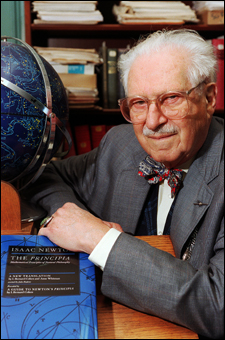History of science scholar I Bernard Cohen dies at 89:
A Harvard man from undergraduate to emeritus

I Bernard “I.B.” Cohen, Victor S. Thomas Professor of the History of Science Emeritus at Harvard University and a pioneer in the field of the history of science, died of a bone marrow disorder June 20 at his home in Waltham. He was 89. A renowned scholar of Sir Isaac Newton, Cohen produced “Principia: Mathematical Principles of Natural Philosophy,” the first English translation of Newton’s “Principia” since 1729.
Born in New York City in 1914, Cohen arrived at Harvard as an undergraduate in 1933 and remained at the University almost steadily until his retirement in 1984. He received the B.S. degree in 1937 and his Ph.D. in the history of science in 1947. His teaching career began at Harvard in 1942, and in 1977 he was named the Victor S. Thomas Professor of the History of Science. He helped found the History of Science Department, one of the first in the country, in 1966.
“He possessed two qualities that made him an excellent teacher and important scholar: he was a commanding and innovative lecturer and a scholar who had a commitment to detail,” said Professor of the History of Science Everett Mendelsohn, who knew Cohen for 50 years, first as a teacher then as a colleague. “The dramatic presentations in his large, popular gen ed and core courses regularly received notice and his translation of Newton’s ‘Principia’ has won wide acclaim for the accuracy and deep knowledge he brought to it,” Mendelsohn continued.
Cohen wrote extensively on such diverse topics as the growth of physics in the 17th and 18th centuries, interactions among the natural and social sciences, and the rise of science in the United States. His books include “Benjamin Franklin: His Contribution to the American Tradition” (1953); “Franklin and Newton: An Inquiry into Speculative Newtonian Experimental Science and Franklin’s Work in Electricity” (1956), and “Revolution in Science” (1985). In 1999, Cohen penned “Howard Aiken: Portrait of a Computer Pioneer” and edited “Makin’ Numbers: Howard Aiken and the Computer,” a collection of essays by Aiken’s contemporaries.
But it was his 1999 translation of Newton’s groundbreaking masterwork “Principia,” completed with the late Anne Whitman ’59, a Latinist, that Cohen considered his most important work.
“I hope that, decades from now, when I and my other books have been forgotten, this will still be useful to scholars and students,” he told the Harvard University Gazette in 1999 (www.hno.harvard.edu/gazette/1999/10.21/newton.html). The translation is 974 pages and took 15 years to complete.
Cohen was a founding member of the Kennedy School of Government’s seminar in science and public policy. In addition to his work at Harvard, Cohen also held lectureships and fellowships at University College, London; Cambridge University; Queen’s University, Belfast; Brandeis University; and Tel Aviv University.
He served as chairman of the U.S. National Committee for the History and Philosophy of Science, president of the International Union of the History and Philosophy of Science, and president of the American History of Science Society.
In 1974, Cohen was awarded the George Sartor Medal and, in 1986, the Pfizer Book Prize, both from the History of Science Society. In 1995, he was elected to the American Philosophical Society. He received an honorary doctorate from George Washington University in 1997, and in 1998, he won the Centennial Medal from Harvard’s Graduate School of Arts and Sciences.
Cohen is survived by his wife of 19 years, Susan Johnson; his daughter, Frances, of New York City; two stepsons; and a granddaughter. His first wife, Frances, died in 1982. He was remembered at a memorial service on July 3 at the Follen Community Church in Lexington.




